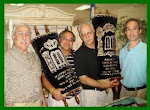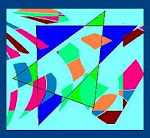And two cases of Jewish Geography from the media
My boyz like to tell me that everything I know I learned in Habonim. Growing up in SA, Habonim was my second family, and in terms of influences I was conscious of, it was probably even my first. My madrichim and my peers played a big role in providing me with a sense of myself within the framework of the Jewish people. If you were to ask me today, who were the biggest influences in my life, I would reflexively select people from that phase of my life. Not some figure from history, or some mentor in medicine, but the people I looked up to when I was growing up. Such is the power of youthful memory, that we cling to notions that provide us with a sense of belonging. In truth, there have been others who have played greater roles - influencing who we are, and what we have done with our lives. Go figure, as they say, one more example of the triumph of legend over logic.
Well, with that said, I had two very recent "encounters" from that past through reports in the media, both connected with Habonim. The first was in the New York Times on Sunday, where a short note from Britain mentioned a report by Michael Skapinker, who was a friend of mine when I was about 13. The second, listed below, was the snippet of an interview with historian Muki Tzur on NPR that I heard as I drove home today. The name "Muki Tzur" rang a really loud bell. I want to say he was a Shaliach in SA, either to the SA Zionist Federation, or to Habonim itself (*1).
Anyway, I thought this short report on new trends in Israel's communal frontiers might be of interest: the urban kibbutz - on NPR
Aleh u'Vaneh, Go up and build!
______________________________
(*1) I finally found confirmation on a web posting that Muki Tzur was indeed a shaliach to SA. Could there possibly be more than just one Muki Tzur?
Tuesday, October 13, 2009
Subscribe to:
Post Comments (Atom)



No comments:
Post a Comment